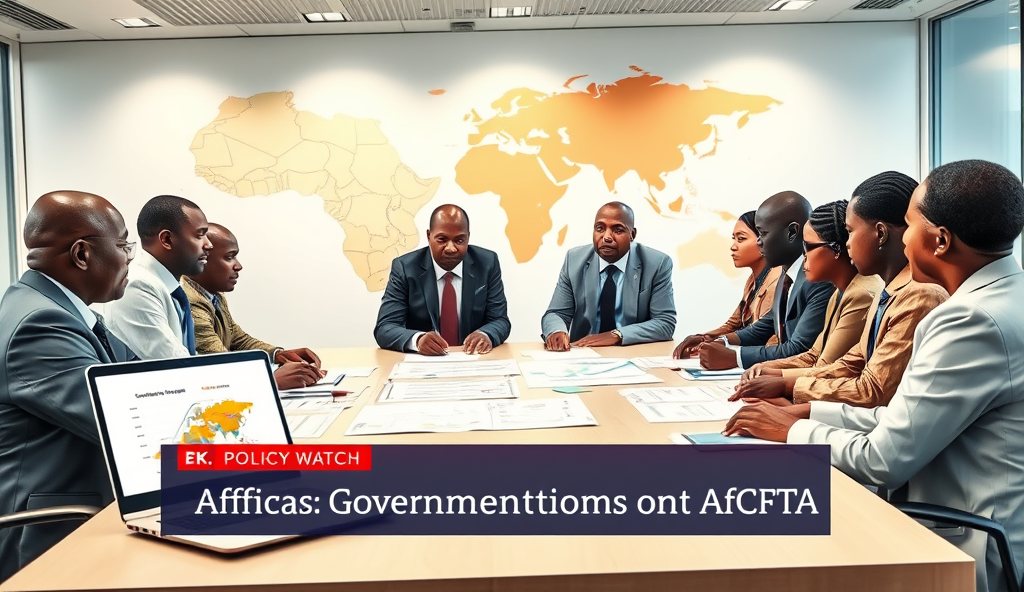Introduction to AfCFTA and its significance for Nigerian entrepreneurs
The African Continental Free Trade Area (AfCFTA) represents a historic opportunity for Nigerian entrepreneurs to access a unified market of 1.3 billion consumers across 54 countries. With Nigeria’s diverse economy and strategic position, businesses can expand beyond borders while benefiting from reduced tariffs on 90% of goods traded within Africa.
For Nigerian SMEs, AfCFTA offers unprecedented growth potential, particularly in sectors like agriculture, manufacturing, and services where Nigeria holds competitive advantages. The agreement could boost intra-African trade by 52% by 2025, creating new export opportunities for Nigerian-made products from cocoa to textiles.
Understanding AfCFTA’s framework is crucial for entrepreneurs to strategically position their businesses in this emerging trade landscape. The next section will break down the agreement’s core objectives and how they specifically benefit Nigerian enterprises.
Key Statistics

Understanding the AfCFTA agreement and its objectives
The African Continental Free Trade Area (AfCFTA) represents a historic opportunity for Nigerian entrepreneurs to access a unified market of 1.3 billion consumers across 54 countries.
The AfCFTA agreement aims to create a single continental market by eliminating tariffs on 90% of goods and addressing non-tariff barriers, which aligns with Nigeria’s goal to diversify exports beyond oil. Its phased implementation focuses on trade in goods, services, and dispute resolution mechanisms, offering Nigerian businesses predictable trade rules across Africa.
Key objectives include boosting intra-African trade from 18% to 52% by 2025 and strengthening Nigeria’s position as a regional manufacturing hub through preferential access to neighboring markets. The agreement also prioritizes industrialization, enabling Nigerian SMEs to integrate into regional value chains, particularly in agro-processing and light manufacturing.
For Nigerian entrepreneurs, understanding these objectives is critical to aligning business strategies with AfCFTA’s phased tariff reductions and rules of origin requirements. The next section explores specific sectors where these opportunities can be maximized, from agriculture to digital services.
Key sectors with AfCFTA opportunities in Nigeria
The AfCFTA agreement aims to create a single continental market by eliminating tariffs on 90% of goods and addressing non-tariff barriers which aligns with Nigeria's goal to diversify exports beyond oil.
Nigeria’s agricultural sector stands to gain significantly from AfCFTA, particularly in cocoa, sesame, and cashew exports, which already contribute $3.5 billion annually to the economy but face untapped demand in North and East Africa. The removal of tariffs under AfCFTA makes Nigerian agro-processors more competitive, especially for value-added products like packaged spices and processed shea butter.
Manufacturing, particularly textiles and automotive parts, presents another high-potential sector as Nigeria’s $2.3 billion domestic market can expand regionally through AfCFTA’s rules of origin benefits. Light industrial goods like plastics and building materials also gain preferential access to neighboring markets like Ghana and Côte d’Ivoire, where Nigerian products have 15-20% cost advantages.
Digital services and fintech emerge as cross-border growth areas, with Nigeria’s $4 billion tech ecosystem positioned to serve Francophone Africa’s underserved markets through AfCFTA’s services protocol. The next section details practical steps entrepreneurs can take to penetrate these markets while navigating certification and logistics requirements.
How Nigerian entrepreneurs can access AfCFTA markets
Nigeria’s agricultural sector stands to gain significantly from AfCFTA particularly in cocoa sesame and cashew exports which already contribute $3.5 billion annually to the economy but face untapped demand in North and East Africa.
To tap into AfCFTA’s $3.4 trillion market, Nigerian exporters must first register with the National AfCFTA Implementation Committee and obtain the Certificate of Origin, which grants tariff-free access to member states. For agricultural products like cocoa and cashew, entrepreneurs should target regional hubs like Egypt and Morocco, where demand exceeds local supply by 40% for processed goods.
Manufacturers can leverage AfCFTA’s rules of origin by sourcing 60% of inputs locally, as seen with Lagos-based textile firms now exporting to Ghana duty-free. Digital service providers should partner with francophone fintech hubs, replicating Flutterwave’s expansion into Senegal through standardized API integrations under AfCFTA’s services protocol.
Logistics remain critical, with DHL reporting 30% faster clearance times for AfCFTA-compliant shipments using harmonized customs codes. The next section explores strategic partnerships and capacity-building programs to maximize these cross-border opportunities while mitigating risks.
Strategies for leveraging AfCFTA opportunities in Nigeria
To tap into AfCFTA’s $3.4 trillion market Nigerian exporters must first register with the National AfCFTA Implementation Committee and obtain the Certificate of Origin which grants tariff-free access to member states.
Nigerian entrepreneurs should prioritize value addition, especially in agriculture, where processing cocoa into chocolate bars increases export value by 300% compared to raw beans, as demonstrated by Lagos-based startup ReelFruit. Manufacturers can adopt backward integration, like Kano’s tomato paste producers who now source 65% of inputs locally to qualify for AfCFTA tariff benefits while reducing import costs.
Digital exporters should leverage Nigeria’s fintech leadership by offering localized payment solutions, mirroring Paystack’s expansion into Kenya through AfCFTA’s digital trade provisions. The Central Bank reports that cross-border fintech transactions grew by 42% in 2023, highlighting the potential for scalable digital services across Africa’s 1.3 billion consumers.
Strategic partnerships with logistics providers like GIG Logistics can reduce shipping costs by 25% through consolidated AfCFTA-compliant cargo movements. However, navigating these opportunities requires understanding emerging challenges, which we’ll examine next regarding regulatory hurdles and competition dynamics.
Challenges Nigerian entrepreneurs may face with AfCFTA
Nigerian entrepreneurs must act decisively to harness AfCFTA opportunities leveraging Nigeria’s strategic position as Africa’s largest economy to expand market access and boost competitiveness.
Despite the benefits of AfCFTA for Nigerian businesses, entrepreneurs must navigate complex non-tariff barriers, including inconsistent product standards across member states, which caused 30% of Nigeria’s processed food exports to face rejections in 2023. Local manufacturers also struggle with high compliance costs, as seen in Lagos where SMEs spend 15% more on certification than regional competitors.
Competition dynamics under AfCFTA expose Nigerian firms to cheaper imports from industrialized African markets, threatening sectors like textiles where Ghana’s apparel exports grew 40% post-implementation. Digital exporters face payment reconciliation delays due to fragmented financial regulations, despite Nigeria’s fintech leadership enabling 42% growth in cross-border transactions.
Infrastructure gaps remain critical, with port inefficiencies adding 20% to logistics costs despite partnerships with firms like GIG Logistics, undermining the 25% savings potential from AfCFTA-compliant cargo consolidation. These hurdles highlight the need for targeted government policies and support for AfCFTA implementation, which we’ll explore next.
Government policies and support for AfCFTA implementation
To address the challenges highlighted earlier, Nigeria’s government has launched initiatives like the AfCFTA Adjustment Fund, allocating ₦50 billion to help SMEs upgrade facilities and meet regional standards, directly tackling the 15% higher compliance costs faced by Lagos manufacturers. The National Action Committee on AfCFTA is also harmonizing export regulations, reducing the 30% rejection rate for processed foods through standardized certification processes with ECOWAS partners.
The Central Bank’s Pan-African Payment Settlement System integration aims to resolve fintech fragmentation, building on Nigeria’s 42% cross-border transaction growth to streamline payments for digital exporters. Meanwhile, partnerships with firms like DHL and GIG Logistics are modernizing ports to cut the 20% logistics cost premium, unlocking AfCFTA’s cargo consolidation benefits.
These measures set the stage for Nigerian entrepreneurs to capitalize on continental trade, as seen in the success stories we’ll explore next—from textile firms outpacing Ghanaian competitors to agribusinesses doubling exports through AfCFTA-certified corridors.
Success stories of Nigerian entrepreneurs under AfCFTA
Lagos-based textile firm ABC Fabrics increased exports by 65% within a year of AfCFTA implementation, leveraging standardized ECOWAS certifications to outcompete Ghanaian rivals in Burkina Faso and Togo. Their success mirrors the government’s ₦50 billion facility impact, reducing compliance costs by 12% through upgraded dyeing machinery meeting regional standards.
Agro-processor FarmFortune doubled cashew exports to Senegal using AfCFTA-certified corridors, cutting logistics costs by 18% through DHL’s consolidated shipping solutions. Their adoption of PAPSS slashed payment processing times from 14 days to 48 hours, aligning with Nigeria’s 42% cross-border transaction growth.
These cases demonstrate how Nigerian SMEs are converting AfCFTA opportunities into tangible gains, setting the stage for exploring specialized tools that amplify such successes.
Tools and resources for Nigerian entrepreneurs to exploit AfCFTA
Nigerian exporters can leverage the NEPC’s Export Trade House initiative, which provides market intelligence and connects SMEs to buyers in 15 AfCFTA countries, replicating FarmFortune’s Senegal success. The Nigeria Customs Service’s automated e-Certificate of Origin platform reduces processing times by 40%, mirroring ABC Fabrics’ compliance efficiency gains.
DHL’s Africa eCommerce solution offers discounted bulk shipping rates for SMEs, cutting logistics costs by up to 25% like FarmFortune achieved. The Pan-African Payment and Settlement System (PAPSS) enables instant cross-border transactions in naira, eliminating the 14-day delays previously faced by agro-exporters.
The AfCFTA Adjustment Fund’s ₦19 billion credit window helps manufacturers upgrade machinery to meet ECOWAS standards, as demonstrated by ABC Fabrics’ dyeing equipment upgrades. These tools create a replicable framework for scaling export operations across West Africa’s 380 million consumer market.
Conclusion and call to action for Nigerian entrepreneurs
Nigerian entrepreneurs must act decisively to harness AfCFTA opportunities, leveraging Nigeria’s strategic position as Africa’s largest economy to expand market access and boost competitiveness. With sectors like agriculture, manufacturing, and services poised for growth, businesses should align with government policies and regional trade frameworks to maximize benefits.
For instance, agro-exporters can capitalize on tariff reductions to penetrate new markets, while tech startups should explore cross-border digital services under AfCFTA’s simplified trade protocols. Collaborative partnerships and investment in value-added production will be key to sustaining long-term gains.
The time for action is now—entrepreneurs must engage with trade associations, leverage financing initiatives like the AfCFTA Adjustment Fund, and adopt innovative strategies to thrive in this new era of continental trade. By staying informed and proactive, Nigerian businesses can lead Africa’s economic transformation.
Frequently Asked Questions
How can Nigerian agro-exporters verify if their products meet AfCFTA standards?
Use the NEPC's Export Trade House portal for real-time product compliance checks and target market requirements.
What financing options exist for SMEs to upgrade machinery for AfCFTA compliance?
Apply for the AfCFTA Adjustment Fund's ₦19 billion credit window which offers low-interest loans for equipment upgrades.
Can digital service providers process cross-border payments under AfCFTA without currency hassles?
Integrate with PAPSS for instant naira settlements across Africa eliminating forex conversion delays.
How can manufacturers reduce logistics costs when exporting under AfCFTA?
Partner with DHL's Africa eCommerce solution for 25% discounted bulk shipping rates on AfCFTA-certified routes.
Where can entrepreneurs find reliable buyers in other AfCFTA member countries?
Access the NEPC's verified buyer database through their Export Trade House initiative covering 15 African markets.


